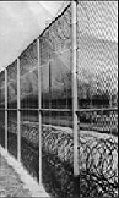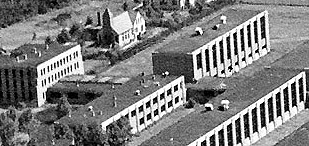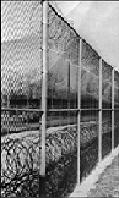BY WAY OF INTRODUCTION
How strange -- a Frenchman as chaplain of a New York city jail? A priest produced by the Mission de France and years of close association with the Brothers of Charles de Foucauld? Why? How? . . . Here in New York I find myself so far from what I am and at the same time so close to what I have always sought . . . . But since Rikers I will never cease to believe in surprises.
I come from a small city in south central France called Millau (20,000 inhabitants) . . . . My paternal grandfather was raised by public assistance, his own parents were unknown. I have carried that about with me for a long time as a kind of "rupture," and I am still convinced that it bore a lot of weight in my orientation toward prison work.
. . . with my father's assistance [I] found my first job as a night operator at the central telephone office in Millau. So, from the period of my adolescence I experienced solitude, working while others slept, resting while others worked. I had time to read and reflect. . . . Many times I used to go out on the balcony and look at the stars, loving, without being able to explain it very clearly to myself, the harmony, reverence and profusion of the heavens. I could think long thoughts, and it was at that time that a choice gradually took shape in me. Since childhood the idea of being a missionary had preoccupied me. . . .
Cardinal Suhard,
founder of
Mission of France
worker-priests.

Click image above from retired Florida International University librarian Salvador Miranda's The Cardinals of the Holy Roman Church web site for more on Cardinal Suhard.
Click image below from the Holy See Press Office at the Vatican for more on Cardinal Roger Etchegaray, prelate of the Mission de France (1975 -- 1982).

The Raphael book has no images illustrating the text. For design and informational purposes, relevant images have been added and captioned by the webmaster.
|
During my term of military service (18 months in
Morocco in 1950-51, in peacetime), and with the advice of a priest friend, I made the final decision to enter the seminary. . . . I loved the Brothers of Charles de Foucauld, founded by Father Voillaume, and knew their contemplative immersion in the poor areas of the world through manual labor and prayer. I also loved the Mission de France, a society of priests founded just after World War II by the archbishop of Paris, Cardinal Suhard, who formed teams of priest workers in factories and workshops, in hand-to-hand combat with unbelief.
The Mission attracted me and, in the end, that is where I went. . . . In 1961 I was ordained a priest in the Mission de France at Pontigny (about a 100 miles from Paris). It was at a crucial moment for the church: John XXIII had been elected three years earlier, and instead of having a transitional pope, we found ourselves in the conciliar spring.
I was initially sent to the south, very close to the Spanish frontier. We were a team of three priests including Jean, Cardinal Etchegaray's brother. We did a lot of reflection and pastoral work with tourists, for the countryside is magnificent and very full of people during the summer. I remained there very happily for three years.
From the gentle Pyrenees I was transferred to the harsh climate of Limousin in central France, to Ambazac, near Limoges. It is a traditional, hardworking region, de-Christianized and even anticlerical. . . . We were four priests in a crowded community of life, parish work and manual labor. I took care of catechism, celebrated Mass and the sacraments and was also a welder in a small shop. . . .
For me, at the same time, there occurred a very furtive reawakening of an old and compelling attraction toward the spirituality of Charles de Foucauld, the converted soldier turned monk who was assassinated in 1916 in the sands of the African Sahara. . . . I was approaching the age of 40 and for me it was almost like a return to zero. Thanks to Father Voillaume I was sent to a novitiate in Italy, at Spello near Assisi. This novitiate included a period of three months in the desert where Charles de Foucauld lived. . . The sky had a total purity and the stars were clear. . . . We had some memorable nights of . . . prayer, completely useless, absolutely necessary - the gratuity, the risk, the danger, the splendor of God.
It was there, in the desert, at the beginning of the '70s, far from all the convulsions of urban life, that I found myself being asked to go to New York. It was a question of joining the team of three brothers already settled in Fourth Street near the Bowery on the Lower East Side. . . . .
Thus it was with this two-fold past as a worker-priest and a Brother of the Gospel that I arrived in New York on Christmas Eve 1970, only for the purpose of living in community. My first vital link with America was the melodies of the midnight Mass. . . . Sung in this little church on Washington Square, in a packed and united throng, it was still the same celebration, the same festal assembly. Even though I arrived in New York as a total stranger, when I was praying in the church with these women and men I was not completely uprooted. . . .
We were then living close to the Bowery in two small apartments, one of which was our chapel. This was my first, brutal contact with the marginal people in this "monster" city. . . . In that old section of Manhattan, the phrase from a book by a Jewish author: "If God does not exist, what happens to suffering? My God, it would all be lost . . ." weighed on my spirit, as did that other expression of Bernanos: "Human suffering is the miracle of the universe." Although I really do not understand Bernanos' statement very well, if at all, if it has any real and concrete meaning, it can be nothing else but the truth of Easter. . . .
If prayer played an important part in the life of the Brotherhood, so did work, the manual labor that was both a necessity for survival and also a means of social insertion depending on opportunities, of which there was no lack. All four of us brothers were kept busy. I was a messenger, carpenter, maintenance worker, welder, orderly in a nursing home, and a medical aide in a detoxification center before I finally ended up at Rikers Island in 1980. . . . The most notable result for me personally would be, undoubtedly, my reintegration into the Mission de France. All this was made possible, of course, by the kindness and hospitality of the diocese of Brooklyn, where I have been living since 1982. . . .
Prayer is a vital necessity in prison. If I did not pray, I would atrophy. If I did not have an interior knowledge of why I am there, day after day, I would die. But it is also the prison that speaks to me of the Mission, in every one of the realities into which it immerses me, through the encounter with flesh and blood human beings. At Rikers it has all begun to make sense for me. Now it is time to enter a little more into the details.





